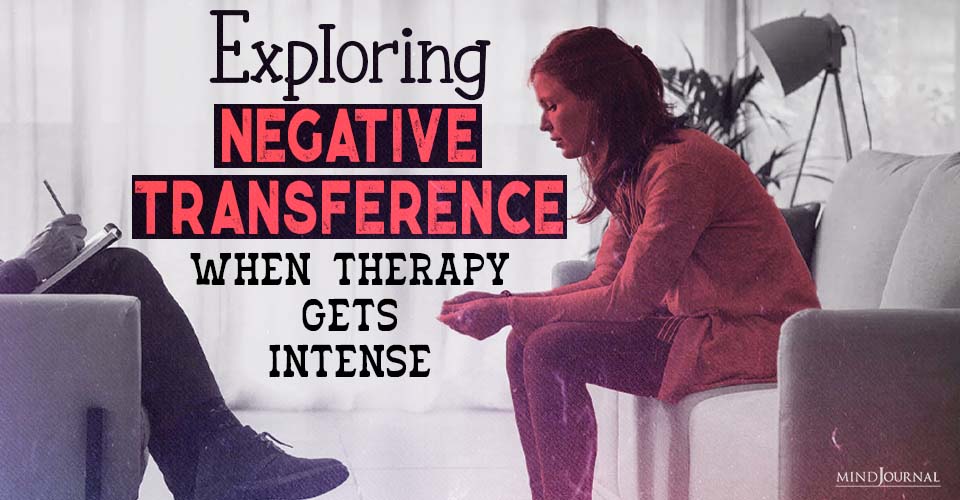Have you ever heard of the term “negative transference”? Well, negative transference can turn therapy sessions into an emotional rollercoaster, and make them unexpectedly intense. Does your therapist suddenly feel like an annoying sibling or a strict teacher? Well, maybe that is what is negative transference.
KEY POINTS:
- Transference is a psychological experience that originates in childhood and is revived in psychoanalysis.
- Melanie Klein’s concept of envy is a major contribution to understanding negative transference.
- Devaluing the analysis and showing indifference to the analyst can prevent a working alliance.
Freud believed that transference was a psychological experience that originated in childhood and was revived in psychoanalysis.
While he discussed both positive and negative transference, I believe Melanie Klein’s concept of envy is the single most important contribution to our understanding of negative transference.
Related: 8 Types Of Childhood Trauma And How To Defeat And Heal From Them
What Is Negative Transference?
“Envy is the angry feeling that another person possesses and enjoys something desirable—the envious impulse being to take it away or to spoil it.” Klein said that envy occurs in a dyad and goes back to the original relationship with the mother. (Melanie Klein, Writings of Melanie Klein, Volume III, Envy and Gratitude, Free Press, New York, pg. 181.)
According to Klein, the first object to be envied is the feeding breast—with feeding comes envy. Hence, it is not surprising that many patients experience envy of their psychoanalyst since he or she “feeds” the patient with insight and support.
Two major defenses against envy in analysis are the patient’s need to devalue the analysis and indifference to the analyst. Both defenses are parts of a negative transference.

In the following case of Sally, the patient’s envy of my ability to “feed” her was in play before she stepped into my office. She experienced our relationship as a zero-sum game; anything I had to offer was experienced as a reflection of her emptiness.
When my friend and colleague, Jessica, called to refer Sally, she said, “She’s an analyst, really smart and a great person. You’re going to love her.”
Sally arrived at my office about 10 minutes before her appointment began. When I opened the door to the waiting room to invite her in, I saw a tall, thin, woman with gray hair.
She was dressed simply in a gray wool skirt and black turtleneck sweater, but there was something elegant, almost aristocratic in the way she carried herself when she got up from glancing at a magazine and entered my office. I felt instantly inferior to her.
I greeted her, “Hello Sally, why don’t you come in.” I invited her to sit wherever she was comfortable. Then I sat in my chair and faced her silently. I thought about the fact that she was a more experienced analyst than I was.
If she had never been in treatment before, I might have waited a minute and if she was silent said, “So tell me what brought you to see me.” But since she was an analyst herself, I just waited for her to tell me why she came.
“Let me tell you about my history.” Her face was expressionless as she pulled aside her long gray hair that was partially covering her right temple and continued. “When I was five years old I was in front of my house waiting for the school bus with my younger brother. A car ran me over and I almost lost my right eye. I was in the hospital for months. They saved the eye, but I have this scar.”
She pointed to a slightly indented grayish patch of skin that started at the edge of her eye socket and extended to her hairline. I made an inaudible noise and grimaced to express my understanding that this was a traumatic experience. But she continued before I could utter a sentence.
Related: 9 Things Your Therapist Might Not Be Telling You
“Then when I was 15, my mother, brother, sister and I were going to California to see my maternal grandmother who was dying. My father dropped us off at the airport in Chicago and then before we got on the plane, a policeman came and told my mother that my father and his driver were in a car accident and my father was dead.”
I gasped in disbelief that so much tragedy had befallen her at such a young age. But she continued telling the story without affect as if she were giving me a chronology of what she did over the weekend.
I wanted to say something empathic to her, but I would have had to interrupt her to do it. I decided to listen until she gave me an opportunity to speak.
When Sally finished telling me the history she thought was relevant for me to know, she turned to telling me about her present life. She told me she had a husband, son and daughter. Then she got around to why she came.
“I’ve come because I’m depressed. I was terribly depressed a few years ago and went into couples therapy with John. It helped, but I’m depressed again and I’m also worried about my son. He doesn’t have a job and I’m afraid he’s not doing the right things to get one. Also, I’m going to be 60 and I feel terrible about it…”
“You haven’t said anything all session. You just sat there like a silent analyst. I guess you’re quite orthodox or maybe you’re just inexperienced.”
I felt “put down” and misunderstood. I needed to say something, but the session was almost finished and I was feeling furious at her. I was afraid I would blurt out something angry. I dug my nails into the palms of my hands to try and get control over myself.
“Well, we’re going to have to stop in a minute. But I think it’s a good thing that you’ve come because it sounds like you’ve experienced a great deal of trauma and loss. Turning 60 seems to be a catalyst for re-experiencing those feelings again.”
I knew I was going to be in for a rocky ride with Sally.
If a negative transference develops in the course of an analysis, after a working alliance has developed, the patient and analyst can work through the negative feelings together. The analysis of envy allows the patient to integrate split off parts of the self and mitigate hatred with love.
But if the patient’s need to devalue the analysis and show indifference to the analyst is in place when the treatment begins, it can prevent a working alliance from developing and prevent the patient from taking in and appreciating what the analyst has to offer.
Related: What Should You Never Tell Your Therapist? 10 Things To Be Careful About During Therapy
Klein pointed out that gratitude is essential in building up the relation to the good object and appreciating the goodness in the self.
(For a further discussion of Sally’s treatment, see Roberta Satow, Our Time is Up, 2024.)
Want to know more about negative transference and transference in general? Check this video out below!
Check out an excerpt from Roberta Satow’s book, Our Time Is Up here:
“The weather in our house was stormy with the promise of thunder and lightning. I walked on the balls of my feet, as if to prepare for the thunderclaps that would slam me across the room. Before I started elementary school, I was alone with my mother when my father left for work at the Hunter Coal Company on Flatbush Avenue.
As usual on Wednesdays, she put on her shmata, a sleeveless cotton housedress that tied across the front. The pink and green flowers on the dress accentuated the scowl on her face. She hated cleaning. But it was her life sentence. She filled a brown plastic bucket with hot water and added Ivory soap flakes and Jane Parker ammonia.
Putting on her yellow plastic gloves to protect her nail polish, she dropped the wooden brush with stiff bristles into the bucket. Then she turned to me and said, “Go out on the porch so I can wash the floor.”
She ushered me down the narrow hall with her gloved hand on the small of my back, and shut the door behind me. Once exiled, peering through the glass panes in the front door, I watched her on her hands and knees scrubbing the linoleum floor.
Her breasts peeked out of her shmata with each forward movement of the brush, and an occasional smile crossed her face as she listened to Rayburn and Finch on the radio.
Outside, the trees tossed in the wind and clouds scudded across the sky. The porch shook from the elevated train that stopped half a block from our house on its way to Coney Island. At the foot of the concrete steps, there were three large dogs—a dirty German shepherd, a dark gray mutt with a wrinkled face and a black snout, and a long-haired white mongrel.
They lived in an empty lot on McDonald Avenue around the corner from our house, and roamed the streets looking for food early each morning. Saliva dripped from the German shepherd’s mouth as he bared his teeth and snarled.
I ran back to the front door. “Ma, Ma the dogs are out here! Let me in! Please, Ma!” I pleaded.
“Be quiet,” she yelled, red-faced with sweat dripping, “and wait on the porch!” I whimpered, “Mommy please, I’m scared of the dogs. . . . ”
The white mongrel growled. I pulled one of the rusted metal chairs as far from the stoop and the dogs as I could get it and crouched behind it. I watched the dogs at the bottom of the stairs jumping up on each other and barking loudly.
They could run up the steps at any moment and I would be cornered. Then I imagined there was an invisible fence at the steps, but it only worked if I kept my eyes firmly fixed on the dogs. I stared at the dogs and chanted, “A hundred bottles of beer on the wall, a hundred bottles of beer, take one down and pass it around, ninety-nine bottles of beer. . . .”
When my mother finished, she poured the brown sudsy water in the kitchen sink, rinsed the bucket and brush, carefully turned the brush upside down to air dry, untied her shmata, andturned on the faucet for her bath. I heard the water running.
The dogs moved on down the block and the terror passed. I stood up and sat in the chair, breathing heavily and staring into space. She did not come out to get me when she was finished. She just took her bath and went to lie down on her bed.
I could see her pull down the quilted bedspread as I stood on my tiptoes peering through her bedroom window that faced the porch. It was safe to go back in the house. The floor must already be dry, but I had to be quiet. I was crossing a mine field and had to hold my breath, tiptoe slowly, and not jostle anything.
Opening and closing the door could cause an explosion. I smelled the light citrus of Jean Nate toilet water as I passed the steamy bathroom on the way to my room. I closed the door carefully behind me and exhaled.”
Written By Roberta Satow
Originally Appeared On Psychology Today










Leave a Reply